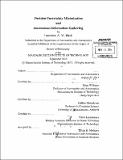Decision uncertainty minimization and autonomous information gathering
Author(s)
Bush, Lawrence A. M
DownloadFull printable version (41.23Mb)
Other Contributors
Massachusetts Institute of Technology. Department of Aeronautics and Astronautics.
Advisor
Brian Williams.
Terms of use
Metadata
Show full item recordAbstract
Over the past several decades, technologies for remote sensing and exploration have become increasingly powerful but continue to face limitations in the areas of information gathering and analysis. These limitations affect technologies that use autonomous agents, which are devices that can make routine decisions independent of operator instructions. Bandwidth and other communications limitation require that autonomous differentiate between relevant and irrelevant information in a computationally efficient manner. This thesis presents a novel approach to this problem by framing it as an adaptive sensing problem. Adaptive sensing allows agents to modify their information collection strategies in response to the information gathered in real time. We developed and tested optimization algorithms that apply information guides to Monte Carlo planners. Information guides provide a mechanism by which the algorithms may blend online (realtime) and offline (previously simulated) planning in order to incorporate uncertainty into the decisionmaking process. This greatly reduces computational operations as well as decisional and communications overhead. We begin by introducing a 3-level hierarchy that visualizes adaptive sensing at synoptic (global), mesocale (intermediate) and microscale (close-up) levels (a spatial hierarchy). We then introduce new algorithms for decision uncertainty minimization (DUM) and representational uncertainty minimization (RUM). Finally, we demonstrate the utility of this approach to real-world sensing problems, including bathymetric mapping and disaster relief. We also examine its potential in space exploration tasks by describing its use in a hypothetical aerial exploration of Mars. Our ultimate goal is to facilitate future large-scale missions to extraterrestrial objects for the purposes of scientific advancement and human exploration.
Description
Thesis: Ph. D., Massachusetts Institute of Technology, Department of Aeronautics and Astronautics, 2013. Cataloged from PDF version of thesis. Includes bibliographical references (pages 272-283).
Date issued
2013Department
Massachusetts Institute of Technology. Department of Aeronautics and AstronauticsPublisher
Massachusetts Institute of Technology
Keywords
Aeronautics and Astronautics.